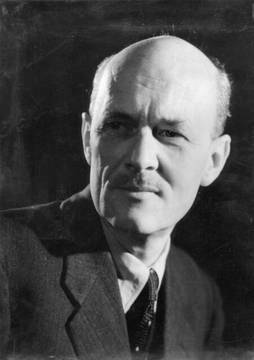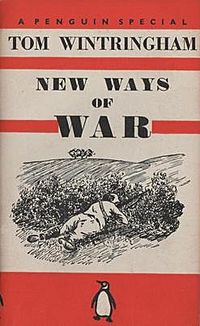Tom Wintringham facts for kids
Quick facts for kids
Thomas Henry Wintringham
|
|
|---|---|
 |
|
| Born | 15 May 1898 Grimsby, Lincolnshire, England |
| Died | 16 August 1949 (aged 51) Owmby, Lincolnshire, England |
| Allegiance | |
| Service/ |
|
| Unit | The "Abraham Lincoln" XV International Brigade |
| Battles/wars | Spanish Civil War |
| Spouse(s) | Elizabeth Arkwright, Millie Baruch, Kitty Bowler |
| Children | 4 |
Thomas Henry Wintringham (born May 15, 1898 – died August 16, 1949) was a British soldier, writer, and politician. He was also a military expert and a supporter of the Home Guard during the Second World War. He helped start the Common Wealth Party.
Contents
About Thomas Wintringham
His Early Life
Tom Wintringham was born in 1898 in Grimsby, England. He went to Gresham's School and then Balliol College, Oxford. During the First World War, he paused his studies. He joined the Royal Flying Corps and worked as a mechanic and motorcycle rider.
After the war, he returned to Oxford. He visited Moscow for several months. When he came back to England, he helped form a group of students. Their goal was to create a British Communist party. After graduating, Wintringham moved to London. He worked full-time in politics there.
His Political Work and the Spanish Civil War
In 1923, Wintringham joined the Communist Party of Great Britain. In 1925, he was one of twelve party members. They were sent to prison for their political writings. In 1930, he helped start the Communist newspaper, the Daily Worker. He was one of the few writers whose name appeared in the paper.
He also wrote for the party's magazine, Labour Monthly. Here, he became known as the party's military expert. He wrote articles and booklets about military topics. He warned about air attacks and asked for air raid precautions years before the bombing of Guernica. His ideas helped shape government policy on air raid safety.
Wintringham believed in different political ideas than some in his party. He thought groups should work together, not fight each other. His ideas became more popular when the party started the 'Popular Front'. This was a way for different groups to unite.
In 1934, he started Left Review, a British magazine about literature. It was the first British magazine with a Marxist aim. Even though Wintringham published it and the Communist Party funded it, it welcomed writers from all socialist groups.
When the Spanish Civil War began, Wintringham went to Barcelona. He was a journalist for the Daily Worker. But he soon joined the International Brigades. He even became a commander of the British Battalion. Some people say he came up with the idea for these "international" brigades.
In February 1937, he was hurt in the Battle of Jarama. While recovering, he became friends with writer Ernest Hemingway. Hemingway even based a character on him. Wintringham spent months teaching others how to use machine guns. He got sick with typhoid and was wounded again in August 1937. He returned home in October. His book English Captain is based on these experiences.
In 1938, the Communist Party accused his partner, Kitty Bowler, of being a spy. Wintringham refused to leave her. Instead, he quit the party. He began to distrust how much the party followed Joseph Stalin's Soviet Union. Back in England, he started working for the magazine Picture Post.
His Role in the Second World War
After returning from Spain, Wintringham called for a civilian army. He wanted them to fight off any invasion by the Axis powers. As early as 1938, he campaigned for what became the Home Guard. He taught soldiers guerrilla warfare tactics. This included a move called the 'Monkey Crawl'. He also taught them how to deal with dive bombers.
When the Second World War started, Wintringham tried to join the army as an officer but was rejected. He strongly disagreed with the Communist Party's decision to stay out of the war. He also thought the government leaders were too friendly with the Nazis. He wrote for Picture Post, the Daily Mirror, and other newspapers.
In May 1940, after the escape from Dunkirk, Wintringham supported the Local Defence Volunteers. This group later became the Home Guard. On July 10, he opened a private training school for the Home Guard. It was at Osterley Park, London.
Wintringham's training methods came from his time in Spain. He even had veterans from Spain help train volunteers. They taught anti-tank warfare and how to use explosives. He also taught street fighting and guerrilla tactics. He wrote many articles promoting his ideas about the Home Guard. His motto was "a people's war for a people's peace."
The British Army thought Wintringham was not trustworthy because of his past. After September 1940, the army took over the Home Guard training at Osterley. Wintringham and his friends were slowly pushed aside. He resigned in April 1941. Even though he worked hard for the Home Guard, Wintringham was never allowed to join it himself. This was because of a rule against members who were Fascists or Communists.
In 1942, Wintringham helped create the Common Wealth Party. He ran for election in 1943 and got almost half the votes. In the 1945 election, he ran again. His wife, Kitty, also ran for election. Neither of them won. After the war, Wintringham and many others from the Common Wealth Party joined the Labour Party.
His Later Life
In his later years, he mostly worked in radio and film. He made documentaries and wrote reviews. He continued to write about military history. He was against atomic weapons. He supported China under Mao and Yugoslavia under Tito. He did not like the strict government of the Soviet Union.
He also campaigned for a 'World Guard'. This would be a neutral group of volunteers. They would help keep peace in places like Palestine and India. This group would work with the United Nations.
Tom Wintringham died on August 16, 1949, at age 51. He had a major heart attack while visiting his sister's farm in Owmby, Lincolnshire.
Images for kids
 | Laphonza Butler |
 | Daisy Bates |
 | Elizabeth Piper Ensley |



